- Home
- Adam Cesare
Tribesmen
Tribesmen Read online
Praise for Tribesmen:
“Tribesmen is a gory and clever homage to those Italian cannibal flicks that we all love so dearly, but without the real-life animal cruelty! Highly recommended.”
–Jeff Strand, author of Pressure and Wolf Hunt.
“Sometimes everything goes wrong, in the best possible way. Think Snuff and Cannibal Holocaust meeting at a midnight movie. And then give one of them a camera, the other a knife.”
– Stephen Graham Jones, author of It Came from Del Rio and Demon Theory
“The best new writer I’ve read in years. Wonderfully lean prose and edge-of-your-seat thrills. Drop everything else and start reading Tribesmen.”
–Nate Kenyon, author of Sparrow Rock and Starcraft Ghost: Spectres
Content
Start Reading
About the Author
Introducing Ravenous Shadows
Copyright Information
Dedication
For anyone who’s ever been brave enough to pick up a camera in an attempt to make art...even if you didn’t succeed.
Acknowledgements
The two people most responsible for this book are my loving and supportive parents. If you’re going to blame anyone, blame them for not deterring their kooky son’s interest in horror.
Also of chief importance is John Skipp, writer and editor extraordinaire. Skipp took a chance on me, made this book the best it could possibly be, and I hope that one day I’ll be able to repay him.
On the homefront I’d like to thank my lovely girlfriend Jen, along with my best buddies and occasional-beta-readers Josh, Kyle and Phil.
Thanks also to my friends in the publishing industry. Nate Kenyon for being so generous with his time and expertise, Dallas and Kristy for the advice and book recommendations, and Christine and Dylan at Paracinema for their support of my film criticism.
Finally, warmest thanks to Debbie Rochon for the inspiration. Some say scream queen, I say star.
A LOVE LETTER FROM THE EDITOR
Dear Reader –
WELCOME TO RAVENOUS SHADOWS: a new line of frequently-savage, always-provocative genre fiction, dedicated to the proposition that short, powerful novels and novellas can pack as much punch, personality, and plot as books three times their size.
For example, take this crazy motherfucker!
Back in the distant 1980s, a slew of Italian jungle-based exploitation films with titles like Cannibal Holocaust and Make Them Die Slowly gobbled grindhouse marquees and international attention, often trumpeting in their advertising campaigns precisely how many countries they’d been banned in. Indeed, director Ruggero Deodato was dragged to court to prove that his actors had not been slaughtered in his hyper-realistic mise-en-scene. (Real animals died, which helped confuse the issue. And the fx were frankly astonishingly convincing.) The actors, unkilled, got Deodato off the hook.
If only the characters in this book were so lucky.
Now, decades later, a work of fiction finally expertly captures and transcends the insanity of those pictures and those times. A cunning, cinematic redmeat feast for weird film lovers and horror freaks, Adam Cesare’s Tribesmen is a first-rate literary midnight movie, and a blistering debut. BRING YOUR FRIENDS!
Then please feel free to check out the rest of the madness here at Ravenous Shadows, where the cool shit has just begun to hit the fan.
Yer horror-lovin’ pal,
John Skipp
Editor-In-Chief
1/22/2012
Prologue
THE ISLAND
The strangers had returned.
Both the rafts and their passengers were small white dots on the morning horizon. Oroto paid them little attention and tightened his grip on the thatched mesh of the fishing net. His son Vatu stood further up the shore, paying no attention to what he was doing. His dark eyes were fixed out over the ocean, watching the pale men approach.
“Pick up your end! Stop staring at the boats and help me,” Oroto barked, surprised at his own impatience with the boy. Every time they visited, Oroto’s son was fascinated by the men and their peculiar rafts. Vatu’s excitement would have to be curbed: this month over half of the village’s crop had already failed. Fishing was the only way Oroto was going to be able to feed his family. His son could waste time later.
Besides the fact that their skin was the color of sand, their hair that of dead grass and their language unintelligible, there was nothing particularly novel about the men. The travelers were permitted to come ashore the island a few times a season to trade. Without a common language, the men were forced to gesture for what they wanted. The pale men’s sign-language amused Vatu (and even some of the more ‘mature’ villagers) as they offered chickens and other less-than-useful trinkets in exchange for a place to sleep for the night.
Before the sun would rise the next morning, the men would be gone, embarking on the next step of whatever journey it was that they were making. Oroto didn’t particularly care who they were or where they were headed, as long as they paid his people for the privilege to stop.
On behalf of the islanders, Oroto and his family were voted the brokers of these deals. Oroto was always glad to take the chickens, and his mother would then divide the rest of the take amongst the tribe. No one ever complained about the arrangement. The people of the island respected age, and there was no islander older than Oroto’s mother. None of the islanders seemed to care much whether strangers bedded down on their meager piece of land for the night, as long as they weren’t carousing or bringing their white devil gods with them off of their boats.
“Where are the chicken cages?” Vatu asked. He squinted against the light to make out the approaching visitors, shading his eyes with one of his small black hands.
“Maybe this time they will bring us fish,” Oroto said, softening his chastisement. “We’re going to need them, too, because I have a lazy son who catches nothing but sunshine and questions.”
Vatu gave a short giggle before he went silent and returned to casting out the fishing net. The boy had caught a glimpse of his father’s serious expression, and one stern look was all that Oroto needed to use.
The pale men were taking their time. They were not rowing yet, but instead allowed the ebb of the tide to pull them closer to the island. This was odd, but even more abnormal still was the large number of rafts they had arrived with today. Five hollowed-out crafts with three to four passengers each.
“The bones,” a voice called from the end of the beach.
Oroto turned towards the jungle to see his mother running out of the clearing. Puffs of sand flew up as she trudged down the upper part of the beach as fast as her gnarled legs could carry her.
Oroto let go of the fishing net and ran up the beach to meet his mother. As he closed the distance he yelled back to Vatu. He had to make sure that the boy brought in the rest of the fish.
His mother collapsed to her knees before he could reach her. Her small body was wracked with sobs as she writhed, clawing at the sand. Oroto placed one strong hand on her back, feeling the bumps of her spine as they jumped up and down with her cries.
“What bones?” Oroto asked, but he knew exactly what the old woman had meant. She had been up to her magic again. She used an odd collection of chicken bones and broken boar’s tusks to look into the future. Or so she claimed.
She had collected the bones over her long lifetime, tossing them up into the air and making notes in the sand as to how they fell. With these bones she read the fortunes of the girls in the village. Normally, she used the practice to see who would be married and who would soon be pregnant: she was more of the village matchmaker than she was a psychic. The bones had never made her this upset.
“What is it mother? What did you see?” Oroto helped her to her feet and
glanced back to see Vatu hurrying to gather up the net and the few small fish inside it.
Beyond the boy, he could now just make out the faces on the men in the first raft. Their faces were red, not the usual tannish-white. Also the men were rowing now, apparently no longer content to coast into shore.
“Call Vatu in to us,” she said, and then she screamed out to the boy herself before Oroto had the chance: “Leave that, run up here!” Vatu looked at his grandmother, puzzlement etched into his face, then back to his father.
Oroto was hesitant to wave the boy in. Vatu held the net firmly in his grasp, reluctant to drop it before Oroto told him to do so. It would be a shame to waste the fish on the orders of a superstitious old woman.
“Please call him in,” his mother said, squeezing Oroto’s hand in hers. Oroto could feel the dry folds of her old skin, and her earnestness made his decision for him.
“Hurry up, boy,” Oroto said, glancing beyond his son again, looking at the fast-approaching boatfuls of white men.
Then Oroto saw it. Blood. It was blood turning the white men red. They were covered in it from head to belly.
He then noticed that the lead man in the second raft was not a man at all, but instead a skinned corpse, propped up like a masthead. The corpse’s skin was flayed, stretched across the back of the second raft and drying in the morning sun.
The men at the front raft were rowing with supernatural speed now. Seafoam frothed up from the ends of their oars and a fine mist enveloped the bow of their little craft. Behind them, the other four boats were following suit. There were never more than two rafts of white men at a time, but now there were five.
Vatu gathered up the net in both hands, juggling the two or three fish trying to flap their way to freedom. Oroto urged him on, and he dropped the net, beginning to run from the churning surf. Despite Vatu’s constant insistence that he was nearly a man, the boy still had the ungainly waddling gait of a child.
His son was oblivious to the men that, a few minutes prior, he could not take his eyes off.
The men in the rafts were maybe twenty meters from shore when the first of them jumped off the side of his vessel. The big, bearded man splashed into the water. It was shallow enough to stand, and the line of the crystal blue water came up to the middle of his bloodied chest. The spot where he hit the waves immediately exploded into a cloud of burnished red.
The man screamed out in ferocity (or was it pain?) and began running. The waves sloshed against his face. The sea water cleaned off some of the blood, but the bearded man’s skin was still crimson with sunburn and exertion.
As the second white man hit the water, Oroto sprung to his feet, intent on saving his young son.
Vatu must have seen the frenzy in his father’s eyes, because he turned then, from his grandmother to the men coming up onto the shore behind him. “Father,” the boy cried, breathless and terrified. The men left red streaks in the water as they closed the distance between their boats and the boy.
Oroto stopped, halfway between his son and his mother. The sun was so hot that it had turned the white sand of the beach into fire. It was the kind of flame that licked the bottoms of your feet if you did not move with enough haste.
The biggest man, the first off the boat, would be the first one to reach his son. Sea water, spittle and grue ran down his neck as he removed a large hook from the scabbard of his belt. The cast iron hook was the same kind they used to hang up pigs at the larger ports that surrounded their small island.
One disgusting white calloused hand grabbed Vatu by the shoulder, like a white scab on his beautiful, healthy skin.
The man’s other fist brought the hook down, straight into his son’s neck.
Oroto screamed, a wild sound. It was the sound a boar made when you had it cornered, the scream an animal makes when it knows that it’s too late
“Get up! We have to run!” Oroto shouted to his mother, as he raced back toward her. But he knew she could not run. He scooped one big arm around her waist and hoisted her up like a baby. She was not a little woman in her youth, but the years had dried and hollowed her like a prune. She weighed almost nothing in Oroto’s strong arms.
“The bones, I have seen that there is no escape.” Her voice was too calm. How could she be this calm after seeing what happened to her grandson? Oroto wanted to get to the village, rouse the men and kill these bastard invaders with his bare hands.
He could hear the pounding of footsteps behind him, and the laughter of the red devils as they nipped at his feet.
It happened too quickly after that. Oroto’s left foot made an unlucky choice and disappeared into a deep hole in the sand, snapping his ankle. Some animal, maybe a crab or marmot, had dug the hole, and that hole had destroyed him.
The pain was excruciating, the sound of breaking bone loud enough to startle the jungle beasts. He heard chirps and cries as creatures rustled, fleeing deeper into the brush. Oroto made sure to toss his mother clear of his landing, extending his arms to try to cushion her fall.
The laughter of the men gave way to their dark shadows, spilling down upon mother and son. The hot sand burned Oroto’s arms and stomach as he lay defenseless.
“You bastards,” Oroto said, even though they would never understand.
One of the men put a soggy boot into the small of Oroto’s spine. The laughing man pinned Oroto to the sand.
“Mother,” Oroto said. The word came out a whimper. He had cried out for his mother in front of these men, these beasts that would kill a child.
His mother paid Oroto no attention; she was too busy scratching her ancient marks in the sand. The angular characters were ones Oroto had never seen her write. She spoke in the same clear, detached tone that she had taken to Vatu’s death.
“I curse this place,” she said. “I curse these men. I curse every grain of sand on this island. And I am ready to die.”
They were the last words she ever said, and the last that Oroto would ever hear.
The white men gathered around their bodies.
And painted themselves red again.
Chapter 1
Roland Pressberg
Executive Producer
A scream reverberated around the room.
The skinny redhead fell to her knees. She was surrounded by three nearly naked men. Over their dark skin, they wore a fine layer of gray ash, hair matted with clumps of dirt and mud. Their loincloths barely covered their buttocks, which quivered in anticipation of their next meal.
Grabbing at her tattered blouse, the center male gave a grunt of excitement. His hair was the dirtiest and his teeth were the greenest. This meant that the makeup girl had spent the longest amount of time on him, indicating to the audience that he was the group’s leader.
After the men were done clawing away her undergarments, they set to work on her flesh.
“God damn it! Tito. Why do I have to watch this shit?” Pressberg stubbed out his cigarette and stared down at the ashtray on the coffee table in front of him. He had no desire to see whatever disgusting special effects the demented fucking Italians who made this shitty movie had come up with.
“But watch, this is the best part,” Tito said. His English wasn’t terrible, but his accent was laughable. His dialect was an inconsistent cartoon mix of Spanish, French and Italian. He held onto his ‘e’ sounds too long and put ‘a’ sounds on the end of words that didn’t need them.
Tito’s English was made impervious to criticism by the fact that he was also fluent in four other languages. Unless you could speak six languages to his five, you’d best leave his humorous pronunciation alone.
Tito pointed towards the screen as the film stained the walls of Pressberg’s office red. Pressberg was dumb enough to look. The shot was a tight close-up of one of the ashy man’s teeth as he squished down on one of the redhead’s eyeballs.
Pressberg felt his stomach attempt a somersault.
“It looks fucking real,” he said, suppressing a gag. “Are you sure it’s even l
egal to be watching this in this country?” Pressberg hid his eyes in his hands again.
“No. Of course it’s not legal in Portugal, are you kidding? Legal? In Portugal? Hah! All of this guy’s movies are banned here,” Tito smiled. “But don’t worry: that’s not a human eye. It’s a goat eye. You can get anyone to eat anything, if you are having them eat it for the cinema. It is quite a neat trick.”
Tito pronounced ‘cinema’ as ‘chin-e-ma.’ It was one of those holdovers from Italian that Tito kept consistent, no matter what language he was speaking. The word sounded pretentious, and Pressberg suspected that was exactly the way Tito liked it.
Tito Bronze had never been a name synonymous with art films. More like fuck films and exploitation garbage. It were as if the little man thought that by tossing in the word ‘cinema’ often enough, he could fool you into believing he was François Truffaut.
Pressberg was no longer even facing the screen, but he could still hear the munching of the three ashy men and the vaguely sexual moans of the redhead as she was torn apart. If this were real life, he thought, she would be dead already, not coming.
But it wasn’t real life. It was the movies, and garbage like this played just as well in the Euro-markets (with a few cuts) as it did in America.
“Alright, I’ll turn it off. Is that okay? Is that what you want, you big baby?” Tito asked, heaving himself up from the half-eggshell chair with both arms. Tito’s open silk shirt billowed behind him like a cape as he rose.
The shirt was a disgustingly bright and brash floral pattern. Pressberg’s father had been fond of saying that you could tell a lot about a man from the way he dressed. This meant that Tito was a clown.
“In business,” Tito continued, “you are a very hard man, but in entertainment, you are as soft as her tits.” Tito pointed once more to the screen, indicating the redhead’s exposed breasts. They were slathered in fake blood so radiant and unrealistic that you could paint a barn with it.
“So this is it,” Pressberg asked. His tone was not defeated, per se, just resigned. He didn’t have to elucidate any further. Tito knew what he meant. What Tito heard was something like: This is it? This is your next bafflingly profitable piece of shit? The next project I’m bankrolling?

 Clown in a Cornfield
Clown in a Cornfield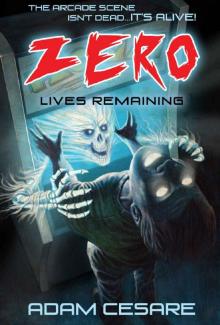 Zero Lives Remaining
Zero Lives Remaining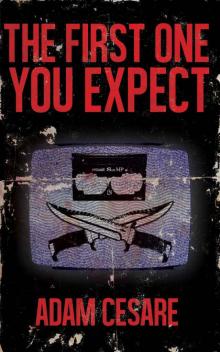 The First One You Expect
The First One You Expect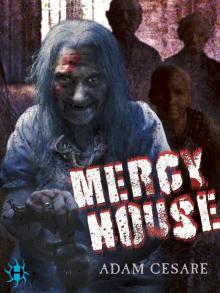 Mercy House
Mercy House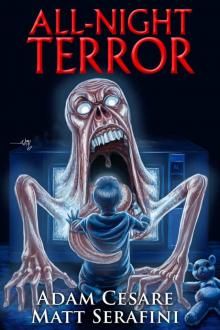 All-Night Terror
All-Night Terror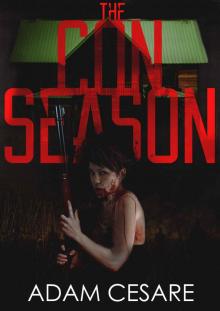 The Con Season: A Novel of Survival Horror
The Con Season: A Novel of Survival Horror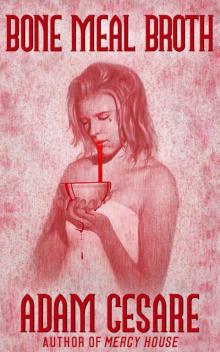 Bone Meal Broth
Bone Meal Broth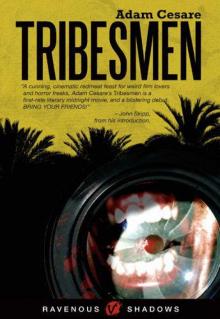 Tribesmen
Tribesmen